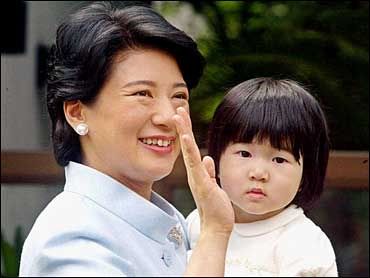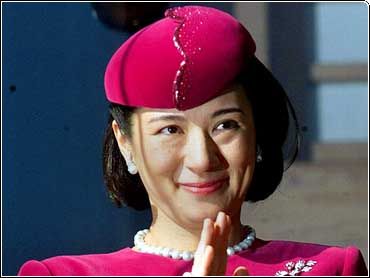Japan's Sad Princess
TOKYO - It was a fairy tale romance: the commoner marrying the heir to Japan's Imperial Throne. But as CBS News Correspondent Barry Petersen reports, Princess Masako's life is anything but happily ever after. Harvard and Oxford educated, she was an accomplished diplomat before her marriage. But now, her only job is to produce a male heir. Her first child, a girl, cannot take the throne.

Having a beautiful daughter the country virtually dismisses and being criticized for her failure to have a son is tearing the 40-year-old princess apart. She is now in seclusion and reportedly battling depression, says an old friend. "She seems to be quite sensitive," says Yukie Kudo. "She cries a lot." The fate of the princess is not that unusual in Japan.
Beneath the 21st century glitter, some women are still bound by ancient traditions dictating their role after marriage as housewife and mother. No wonder as many as a third of young Japanese women say they are not interested in getting married and conforming to a strict cultural formula once they become a wife. And it is the young women who feel for Masako the most. "Those who are career oriented and who are active in society feel strongly that she should be allowed to act like a person (and) not as a sort of puppet," says George Fields, an expert on Japan.

A modern princess can influence the whole world, as Princess Diana did in her fights for AIDS patients and against landmines. Princess Masako could have the same talents, but we may never know. In an extraordinary public admission for the secretive Imperial household, her husband says she is deadly tired and unable to travel. So when her husband goes abroad, the woman trained as a diplomat stays at home, trapped in a royal household that some call the last cocoon of feudalism.


Having a beautiful daughter the country virtually dismisses and being criticized for her failure to have a son is tearing the 40-year-old princess apart. She is now in seclusion and reportedly battling depression, says an old friend. "She seems to be quite sensitive," says Yukie Kudo. "She cries a lot." The fate of the princess is not that unusual in Japan.
Beneath the 21st century glitter, some women are still bound by ancient traditions dictating their role after marriage as housewife and mother. No wonder as many as a third of young Japanese women say they are not interested in getting married and conforming to a strict cultural formula once they become a wife. And it is the young women who feel for Masako the most. "Those who are career oriented and who are active in society feel strongly that she should be allowed to act like a person (and) not as a sort of puppet," says George Fields, an expert on Japan.

A modern princess can influence the whole world, as Princess Diana did in her fights for AIDS patients and against landmines. Princess Masako could have the same talents, but we may never know. In an extraordinary public admission for the secretive Imperial household, her husband says she is deadly tired and unable to travel. So when her husband goes abroad, the woman trained as a diplomat stays at home, trapped in a royal household that some call the last cocoon of feudalism.


<< Home